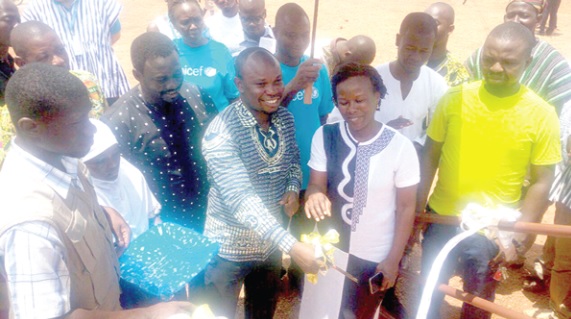
UNICEF provides sanitation facilities for schools in Tamale
United Nations Children’s Fund (UNICEF), with support from the Government of the Netherlands, has provided some basic schools in the Tamale Metropolis with improved sanitation facilities to promote basic hygiene and sanitation practices among schoolchildren in the metropolis.
Advertisement
Ten basic schools in the Tamale Metropolis, including the Central Zaharia T.I Ahmadiyya Primary and Junior High School (JHS) in the Northern Region, are each benefitting from the improved sanitation facilities to provide access to safe drinking water, toilets and hand-washing stations for children in urban areas.
The sanitation facilities
The facilities, which comprise two new six-seater latrines each for boys and girls of the primary and kindergarten (KG) classes, two four-seater latrines each for girls and boys of the JHS classes, an overhead water storage tank, two hand-washing facilities and a stand pipe, were constructed at a cost of $32,000.
All the latrine blocks have cubicles adapted to support the needs of pupils with physical disabilities and those for girls include changing rooms for menstrual hygiene management. They were constructed by the Integrated Action for Community Development (INTAGRAT), in collaboration with the Tamale Metropolitan Assembly (TaMA).
The provision of the sanitation facilities for the schools falls under UNICEF’s four-year urban sanitation project which began in 2015 and is being implemented in the Ashaiman and Ho municipalities, as well as the Tamale Metropolis. The overall aim of the project is to improve the survival and health of urban children in the country through improved sanitation practices.
Prior to the intervention, the school, with a total population of 968 pupils, used a public toilet which they shared with the community, with no access to safe water facility.
Statistics
According to a UNICEF statistics, two out of five public basic schools in Ghana did not have access to sanitation, while three out of five basic schools did not also have access to safe water.
Additionally, 3,600 children in Ghana die every year from diarrhoea and dysentery as a result of lack of access to proper toilets, while five million Ghanaians defecate in the open and do not have access to toilets at all.
Handover
At the handover ceremony, the Country Representative of UNICEF, Madam Susan Namondo Ngongi, said under the urban sanitation project, UNICEF was working with funds from the Government of the Netherlands to improve access to safe toilets for urban communities in the country.
She said 300 of such sanitation facilities had been provided in some urban communities across the country in both schools and communities to halt open defecation and improve access to Water, Sanitation and Hygiene (WASH) facilities.
The Headmaster of Zaharia T.I. Ahmadiyya Primary and JHS, Mr Anabila Atinga, thanked UNICEF and the Government of Netherlands for the facility, saying it would go a long way to improve enrolment and academic performance in the school and also curb truancy among pupils and students of the school.
He noted that as a result of lack of toilet facilities in the school, some of the schoolchildren always came to ask for permission to go and attend to the call of nature but did not return to school, a situation which, he said, affected the academic performance of the children.



